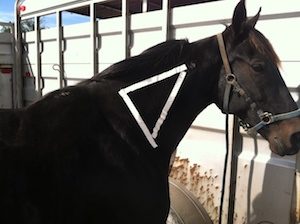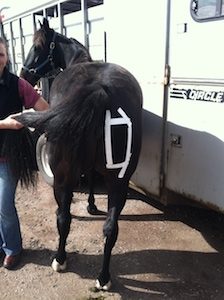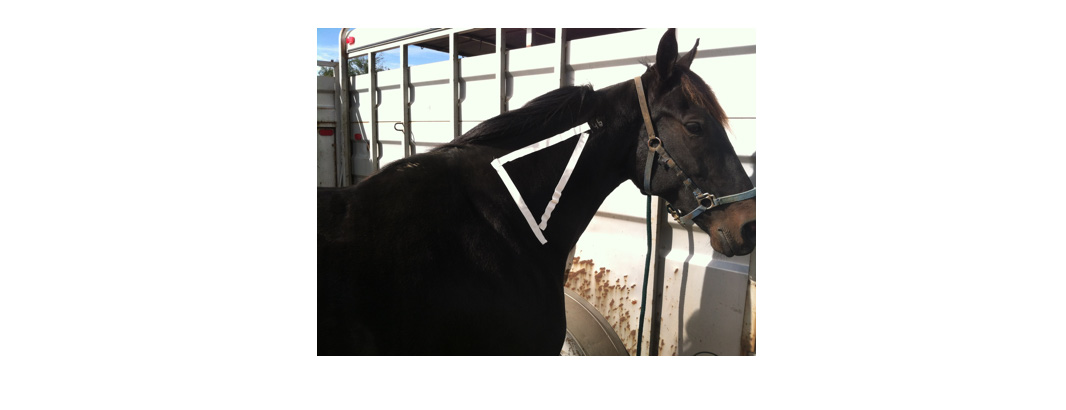Vaccination Protocol and Reducing Adverse Reactions
by R. Paul Schwab, DVM
We commonly get questions about pain, swelling, or lethargy post vaccine administration or other intramuscular injection. Hopefully we can address some of the causes and discuss preventative methods to make the experience easier on your horse. Common complications may include stiffness, pain or swelling at the injection site and, in some cases, inability to lower the head down to eat. These reactions tend to be seen two to three days post administration.
Complications can result from poor technique or be an actual reaction to the vaccine or other medication. Adverse reactions to medications can also include swelling of the face, difficulty breathing and/or hives. The later tend to happen within a few minutes to hours after administration. Treatment of the immediate type allergic reactions such as hives and anaphylaxis should occur promptly. Mild cases can be treated with an antihistamine such as diphenhydramine (Benadryl) or hydroxyzine. More severe cases may need corticosteroids and/or epinephrine.
Reactions like this are why we don’t like people to leave the farm right away after vaccination. You should keep an eye on the horse for an hour or more after injection.
Stiffness and soreness from injections are more commonly seen, especially after vaccinations. Some horses are actually a little lethargic for a day or two and may run a low grade fever. In a way you want to see some horses be a little “dumpy” as it ensures the vaccine is inducing immune response. Mild cases may need nothing more than careful monitoring. Horses with stiffness, mild swelling, and lethargy respond quite well with a few days of phenylbutazone (“Bute”) or flunixin (Banamine). Hot packing the swelling may also give some relief.
If a horse is so sore that they cannot lower their neck, feed and water should be elevated to allow them to eat and drink more comfortably. Severe swelling, especially accompanied by fever, should be seen by a veterinarian. The occasional horse can develop a terrible infection in the muscle. These are often caused from contamination with clostridial bacteria and can be life threatening.
Correct injection site location and technique is probably one of the most important ways to prevent problems. Most vaccinations and many antibiotics are designed to be administered in the muscle. A needle that is 1.5 inches long should be used unless you are giving a shot to a foal or small pony or mini horse. The needle should be advanced all the way to the hub perpendicular to the skin. The neck or the back of the thigh tend to be the best spots to give injections. The top of the rump should be avoided because of the difficulty in treating injection site problems there. If multiple injections are needed over several days, we generally recommend rotating injection sites daily to prevent soreness.


Sterile needles, syringes and clean skin should be self explanatory. The older, duller and dirtier the equipment you are using, the greater chances of problems. Separate needles for each horse and, better yet, separate needles for each injection. The cost of needles is much less than treating a horse for an abscess.
Pay attention to labels. Vaccines and some hormones and antibiotics are typically refrigerated. If they are frozen or heated they may be rendered ineffective or, worse, make them more likely to cause a reaction. This is true also for medicines that are supposed to be kept at room temperature. Also pay attention to expiration dates.
On the day of vaccination, let your horse walk around freely the rest of the day. Standing in the stall all day long after vaccine administration may increase the chances of soreness. Also, keep the package or the serial number of the vaccine or medicine. If you do have any adverse reactions, especially on multiple horses, there may be a problem with the medication itself. You and/or your veterinarian should report it to the manufacturer. Good records on medications and vaccinations given to your horse can be very helpful in preventing future reactions as well. Sometimes a different brand of vaccine may work better for individual horses. Your veterinarian can advise you on which vaccines are absolutely necessary for your situation.
Originally Published November 2014 Issue

The Northwest Horse Source is an independently owned and operated print and online magazine for horse owners and enthusiasts of all breeds and disciplines in the Pacific Northwest. Our contemporary editorial columns are predominantly written by experts in the region, covering the care, training, keeping and enjoyment of horses, with an eye to the specific concerns in our region.






